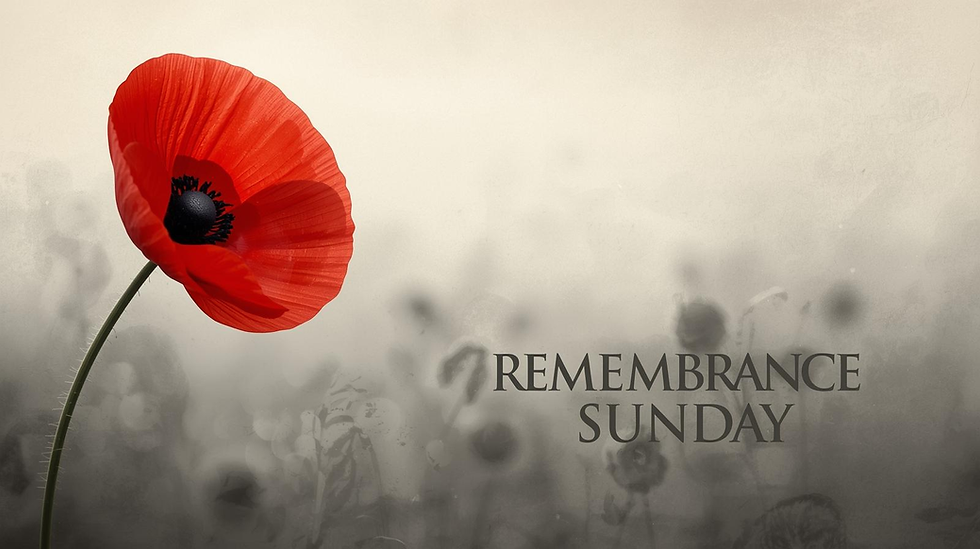Thought for the Week - Remembrance Sunday
- Nov 9, 2025
- 3 min read
I hope that what we do here, how we witness, is of some consolation to those who visit occasionally. Sometimes at baptisms and funerals, I occasionally think ‘why did you want the service in a church’, because it can seem as though I am the only person in the room who believes in what we are doing. Maybe people feel some consolation from the fact that there are those who still believe. Do Christians actually believe in life after death? It depends on what is meant by life. One of the consequences of the two world wars was that the flood of deaths led to a rather banal idea of life after death, as many people began praying for the dead for the first time, they also therefore imagined a slightly strange vision of what the life of the world to come actually is.

We can see this in the flourishing of spiritualism after the first war. The life of the dead was perceived in terms of the technology of the time. The dead could talk over the telephone, as it were, with the medium as an operator, connecting the calls, wobbling the tables, offering a show.
Yet the reality went with a certain lack of mystery. The imagined world was just our own world, but without the pain. “It’s very nice here,” the dead would say, as if phoning from a boarding house in Skegness. ‘Auntie Joan is here too and it’s always sunny’. The knowledge of the afterlife was limited to the travel experience of the medium, and presumably if foreign holidays were common in 1920, the dead would be saying ‘it’s just like being in Torremolinos, only the food is nicer’.
During the second war another way of taking away the pain was found: a host of films about life after death designed to reassure troops and civilians. ‘Here comes Mr Jordan’, ‘A Guy named Joe’, and ‘Blithe Spirit’ are examples. Death was a blip in our ongoing existence, something hardly noticed as we proceed in our happy lives, enjoying cocktails with the dead, seeing it all clearly only, strangely, there is no God, just another life.
It’s understandable that in time of war people should feel tempted to run away from the reality of death. “Nothing is going to happen, nothing will hurt you,” cooed nanny in the nursery as she tucked the children into bed. “In the morning you will wake up in the same bright nursery you fell asleep in.” But Death is real. We endure something terrible in our death. Human beings long for a continuance of this life and cannot conceive of something different. That’s what lies behind the Sadducees’ questioning of Jesus.
They deny the resurrection, but the resurrection they deny is one that will lead to everything continuing as normal. Their argument against the resurrection fails at the first premise: people who are married in this life will stay married in the next, just like in ‘Blithe Spirit’. But Jesus replies that they will not. The question then arises: why is there no marriage?
The answer is: because there is no death. It’s because we are mortal that we need to perpetuate our race by procreation. That’s life as we live it, but the next life is described in strange terms in today’s Gospel. It’s a whole new age which we must be ‘worthy to attain’ without any guarantee that all will succeed. It comes after death, and in that age ‘they cannot die any more for they are equal to angels and are sons of God, being sons of the resurrection’.
Christ, born into this world, does not marry or have children because he is to be the beginning of the new life where there is no death. Instead, in that life, we share in the common sonship of Christ, waiting to complete that sharing by our own resurrection.
When that day comes, we will wake up, not in the nursery where we fell asleep, but to a life beyond death – a life more radically different from this life than the life of adults differs from the life of children. It will be a life for people who have truly grown in Christ. How it will be, we do not know, but we know that Christ is waiting for us, that God is incarnate there, that it is the end of every human life on earth and that we come here to witness to that.
So next time when we sit in church watching occasional visitors wonder what on earth is going on, maybe we can tell them, say ‘this is a hard journey, but we come here to take it together, in faith, hope and love’.
Eternal rest grant unto them O Lord, and let perpetual light shine upon them. May they rest in peace. Amen.









































Comments